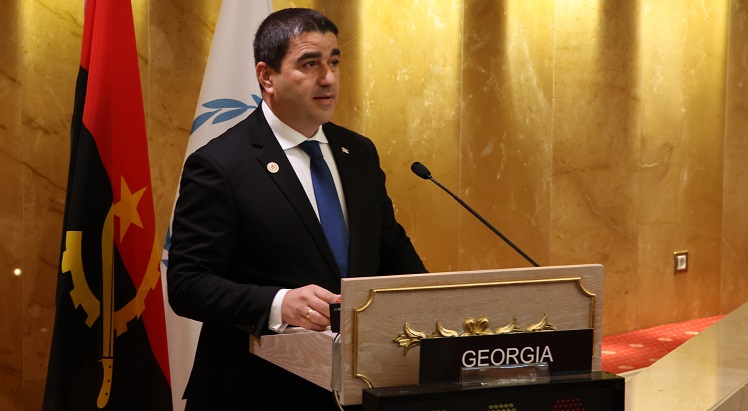Georgian Parliament Speaker condemns conflicts, lauds Tbilisi’s “effective institutional architecture” in IPU address

Georgian Parliament Speaker Shalva Papuashvili on Tuesday addressed the 147th Inter-Parliamentary Union hosted in Luanda, Angola. Photo: Shalva Papuashvili’s Twitter
Georgian Parliament Speaker Shalva Papuashvili on Tuesday condemned the ongoing “brutal war” in Ukraine and the “bloody conflict” between Israel and Hamas, and lauded his country’s “effective institutional architecture” in his address at the 147th Inter-Parliamentary Union hosted in Luanda, Angola.
Papuashvili stressed the current “violent conflicts” were “derailing the global path to peace and prosperity”, and had a “destructive impact” on peace and democracy across the world.
Highlighting the importance of peace on the background of the “complex geopolitical setting”, the official pointed to the “crucial role” of speakers of parliaments in promoting the rule of law and protecting human rights, fostering open and accountable institutions to ensure a “peaceful, stable, and prosperous environment for our peoples”.
Describing stable state institutions as the “bedrock of a strong and vibrant democracy and a backbone of any prosperous society”, he called Georgia “one of the frontrunners” in “effective, innovative and inclusive public services”, combating corruption and organised crime, and achieving transparency and accountability.
Full speech at the 147th IPU Assembly
— Shalva Papuashvili ???????? (@shpapuashvili) October 24, 2023
I feel honoured to address you today on the importance of parliaments in promoting peace, justice, and strong institutions.
Current violent conflicts around the world are derailing the global path to peace and prosperity. Brutal war in… pic.twitter.com/GPt78m3MKu
Papuashvili claimed Georgia’s progress had been reflected in influential international rankings, and noted his country had ranked 20th in the world and 11th in Europe in the recent Corruption Control index by the World Bank, while the latter also ranked Georgia 29th in the world and 14th in Europe for the rule of law.
He further added the Transparency in the Time of War survey by the European Research Centre for Anti-Corruption and State-Building had ranked Georgia 17th in the Transparency Index 2023, placing it ahead of 15 EU member states.
Pointing to threats to state institutions, Papuashvili named disinformation and foreign “malign interference that pose a significant danger to the very foundations of democracy”, and added Georgia had also seen “a rise in disinformation campaigns”, which he said had aimed to “manipulate public opinion, distort the truth and undermine the trust in democratic institutions”.
He claimed the problem consisted of “external geopolitical pressure and dangers of foreign interference”, as well as “rising domestic radicalism and populism”.
Externally, Russia has been ferociously undermining the territorial integrity and sovereignty of Georgia by occupying its historical Abkhazia and Tskhinvali regions; refusing to follow its own international commitments, and maintaining instability and crime on the ground to keep trump cards for potentially exerting influence over the central Government. This must end”, Papuashvili said.
In this note the official stressed the importance of international support of Georgia’s territorial integrity, and extended his gratitude to the United Nations General Assembly, whose resolution this year on the status of internally displaced persons and refugees from Georgia’s occupied regions he said had gained the “record-high supporting votes”.
The IPU was formed in 1889 and now unites 179 members and 14 associate members for facilitating links between lawmaking bodies.
 Tweet
Tweet  Share
Share